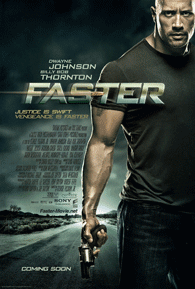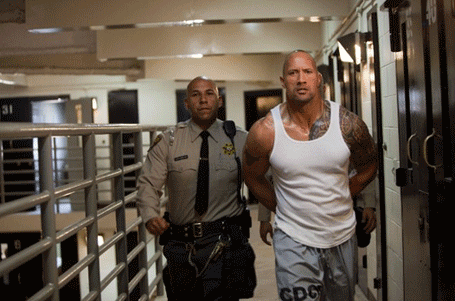
On the most obvious level, Faster plays like a homage to Quentin Tarrantino. Dwayne Johnson is introduced via surtitles as “Driver”, a man with an axe to grind. Betrayed by someone close to him and shot in the head by persons unknown following a bank heist, Driver is out of jail and armed with a handy pistol and list of names to cross out. Speeding in a death-proof muscle car around the Mojave desert, Driver’s murderous rampage is tailed by crooked cop “Cop” (Billy Bob Thornton) and narcissistic overachieving perfectionist assassin “Killer” (Oliver Jackson-Cohen) – who both want Driver taken down for mysterious reasons. Meanwhile, the audience is filled in with the backstory via lengthy expository interludes and flashbacks that recall Kill Bill.
While Kill Bill was a revenge flick that paid tribute to the chambara, the wuxia, and the western, Faster is a revenge flick that pays tribute to the B-movies of grindhouse cinema and Hong Kong hard boiled actioners before John Woo and Johnnie To brought sophistication to the genre. The result is a gritty, period piece whose plot, cinematography, editing, set pieces and sets look and feel like they came out of the 1970s.
For George Tillman, Jr, there is no need for much of a plot or character development – the genres he lifts off merely demand that bloody action takes place on screen, that grim unflinching revenge is exacted, that the multi-layered chase plays out in tempo. For the most part, the director succeeds in creating the 1970s B-movie feel while creating a relatively bloodless grindhouse attempt.
Despite some minor missteps in the third act’s attempt to tie Driver, Cop, and Killer’s story arcs together, Faster is a decent revenge film that if you close your eyes for a few second, might have starred Donnie Yen, Simon Yam, and Ti Lung as the unstoppable avenger, the narcissistic hitman with mental issues, and the sad, crooked cop respectively.

